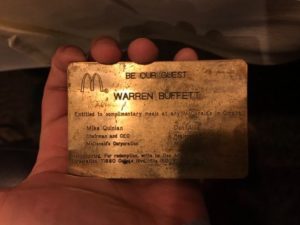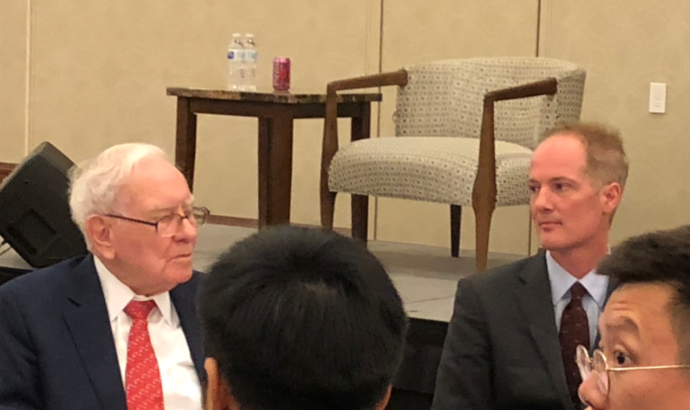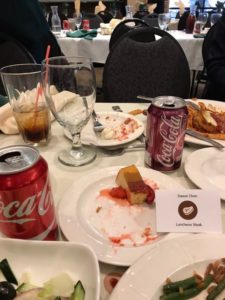In February 2017, I took twenty Peking University students to Omaha to spend a day at Berkshire Hathaway. The trip included 3 company visits, a 2.5 hour Q&A with Warren Buffett, and then a steak lunch sitting with him. I’ve written up the whole experience (see below). The Q&A is located here and below.
But looking back, there were several things that really surprised me. And I am someone who has probably read over a hundred of Buffett’s interviews. And I have studied his investments going back to the 1960’s. Yet in person, certain things he said still really surprised me. They are:
#1. He has not benefited financially from building Berkshire Hathaway.
During lunch, he mentioned to me that he had never sold a single share of Berkshire stock. And as this company has never paid a dividend, that would mean he has not really benefited financially from building or owning a $400B company. .
I was shocked by this. It means he spent his life building a company that created tremendous wealth for the other shareholders and then he gave away his own shares. None of that great wealth ever actually came to him personally.
Of course, I assume he has private investment accounts and that he has been compounding his personal money over the years. So he is probably still very wealthy. But still.
#2. He says his wealth has no real “utility” for him. But he thinks it can have great utility for others.
One of my Peking University students asked a great question about how he views wealth now versus when he started. And Buffett gave a fascinating answer. His main point was that his wealth has no “utility” in his life. He kept using the word utility.
He said he has everything he wants and needs. He has a house, a car, healthcare, a nice television and so on. He doesn’t think owning more things will make him any more happy (“if you buy 10 houses, you have basically gone into the hotel business”). He mentioned the private jet as the one exception to this.
It appears he has lived his entire life on under $100K per year (my guess, supported by his past comments). And above that amount, the money just doesn’t seem to have any use for him.
However, he also said that his wealth could have great utility for others. It could impact other peoples’ lives, such as by sending people to school or by building wells for villages.
I think this contrast in perceived utility (none for him, lots for others) makes him even less likely to spend it on himself. He did mention that he kept the money over the years because he is good at turning it into more money. But now he is actively deploying it to situations where it has real utility.
#3. He is smarter than I thought.
After listening to him speak for twenty minutes, I realized he was smarter than I thought – and I already thought he was really, really smart.
He kept throwing out facts and figures going back decades, especially if they were about his companies. For example, when he mentioned meeting Bill Gates for the first time and he mentioned the exact day they met (I think he said June 4, 1991). I’ve known a lot of really smart people (medical school, Wall Street, Nobel Laureates) and he is clearly operating at a level above most other really smart people.
However, it also came up that he doesn’t know the color of his own office. So I asked him about this. How is it you can remember so many details but don’t know other things at all? He replied that he is basically oblivious to such things. He just doesn’t notice them in the first place.
#4. He gets free McDonalds for life in Omaha.
At one point during lunch, he pulled a gold metal card out of his wallet. It is shown below (no, I didn’t take the picture).
 The engraved card gets him free McDonalds for life – but only in Omaha. That’s pretty cool. I suggested he try it elsewhere and see if the counter person would actually reject him.
The engraved card gets him free McDonalds for life – but only in Omaha. That’s pretty cool. I suggested he try it elsewhere and see if the counter person would actually reject him.
#5. Optimism and rationality are infectious.
I think this is what has stayed with me the most since I’ve left Omaha. That his way of thinking (optimistic and deeply rational) is infectious. Talking to him it was so easy to start to see business and life more clearly. And to also feel more optimistic. I felt it almost immediately in the discussion. I think virtually everyone there did.
During the Q&A, he was asked what was his best investment. His answer was not a company. He said his best investment was in himself and in his friends. His reply was if you surround yourself with great people, you will naturally become a better person. I think his optimism has this same sort of impact on people. Even in lunch meetings.
#6. He is still really excited about his companies and about finding new investments.
At certain points, one of his companies would get mentioned and he would just light up. How is Dairy Queen doing in China? What about Coke? It was clear this was what interested him most and what he really wanted to talk about. Also, he kept saying over and over. If you have a great business, bring it to me. I will be on a plane to China tomorrow if you have a company. And so on.
After 75 years of investing, what he is still most excited about is investing and his companies. That was nice to see.
#7 (last one): His picture will be on Cherry Coke cans in China.
There was a lot of discussion about his companies in China. I mentioned that the Dairy Queen in Beijing uses his photo as promotions at their outlets. He knew about this and then mentioned that they are bringing Cherry Coke to China. And the can will have his face on it. That’s kind of a strange thing to think about. That the face of an Omaha investor is an effective way to sell soda in China.
—-
Ok. I have posted several articles on the whole event (with all his comments).
Cheers, jeff
Also a final recommendation. If you are ever at a meeting and Buffett is in the room, try to sit next to any reserved seat with a Cherry Coke already by it.
The entire Q&A and my complete summary are located here.
- Warren Buffett Q&A with Peking University (February 17, 2017)
- I Took 20 Chinese Students to Meet Warren Buffett. Here’s What Happened (Part 1 here, Part 2 here, Part 3 is here)
——–
I write, speak and consult about how to win (and not lose) in digital strategy and transformation.
I am the founder of TechMoat Consulting, a boutique consulting firm that helps retailers, brands, and technology companies exploit digital change to grow faster, innovate better and build digital moats. Get in touch here.
My book series Moats and Marathons is one-of-a-kind framework for building and measuring competitive advantages in digital businesses.
Note: This content (articles, podcasts, website info) is not investment advice. The information and opinions from me and any guests may be incorrect. The numbers and information may be wrong. The views expressed may no longer be relevant or accurate. Investing is risky. Do your own research.


